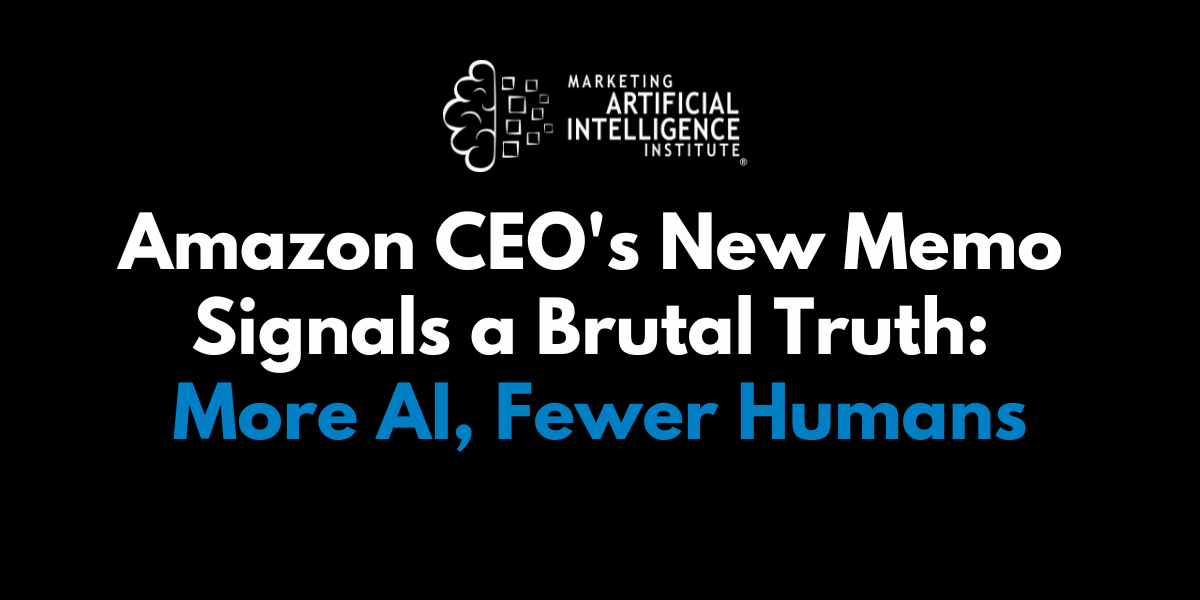In a candid memo to Amazon staff, CEO Andy Jassy wrote that Amazon expects its corporate headcount to shrink in the coming years as it leans deeper into generative AI and intelligent agents.
The language may be wrapped in phrases like "efficiency gains" and "rebalancing," but the implication is clear: fewer humans, leaner teams.
I talked to Marketing AI Institute founder and CEO Paul Roetzer on Episode 155 of The Artificial Intelligence Show about what that means for knowledge workers.
Saying the Quiet Part Out Loud (Again)
Jassy isn't the first CEO to say the quiet part out loud. But he is one of the most prominent to date.
In the memo, Jassy writes:
"Today, we have over 1,000 Generative AI services and applications in progress or built, but at our scale, that’s a small fraction of what we will ultimately build. We’re going to lean in further in the coming months. We’re going to make it much easier to build agents, and then build (or partner) on several new agents across all of our business units and G&A areas.
As we roll out more Generative AI and agents, it should change the way our work is done. We will need fewer people doing some of the jobs that are being done today, and more people doing other types of jobs. It’s hard to know exactly where this nets out over time, but in the next few years, we expect that this will reduce our total corporate workforce as we get efficiency gains from using AI extensively across the company."
It’s a level of honesty many CEOs have avoided. But that may be changing fast.
Doing More With Less
Jassy’s message isn’t an outlier. In fact, it’s part of a growing pattern across corporate America. According to The Wall Street Journal, US public companies have collectively reduced their white-collar workforce by 3.5% over the past three years, even as sales and profits hit record highs.
According to the article, startup executive Jason Lemkin even openly said on a podcast:
"Everyone with 500 employees and up that I talk to, off the record, including public companies, says, ‘I don’t need 30% to 40% of my team.'"
As AI tools grow more capable, the calculus is simple: cut overhead, keep output.
According to the article, middle managers are increasingly in the crosshairs. There may be a reason for that, says Roetzer. He suspects they may lack the quality of "taste" that is becoming increasingly important in AI work—the ability to discern what great outputs look like, and accurately describe great outputs to AI in order to get superior results from these tools.
Roetzer offered a revealing example from inside his own company. He ran a deep research project using AI that produced a comprehensive, in-depth brief on a topic. It looked impressive at first glance, but required validation.
Two people were enlisted to help.
The first was a college intern with a journalism background who was actually trained in source verification. That employee did the first pass.
The other was a senior employee who had the experience and taste to evaluate the overall output's quality and how it reflected on and impacted the larger brand and strategy.
In the first case, while the intern might not have highly developed taste in this context, they did have prior training on the skills needed for an initial pass.
In the second case, the senior employee possessed all the rest of the context needed to truly evaluate the output and how it fit into the company's larger goals.
"I couldn't give the second part of that workflow to a manager," says Roetzer.
That leads Roetzer to suspect there's an emerging approach here that isn't kind to managers:
Entry-level workers can prompt AI and execute, fast and on the cheap. Senior leaders can provide costly, but essential, vision, strategy, and taste to steer overall outputs and outcomes from AI.
What gets squeezed is everything in between.
And Even More Dire Job Predictions
Meanwhile, we're hearing even more dire predictions from the world of finance.
At the SuperReturn International conference, Vista Equity Partners CEO Robert Smith made a stark prediction:
"We think that next year, 40% of the people at this conference will have an AI agent and the remaining 60% will be looking for work," he said to an audience of leaders from major investment firms.
Smith may have been hyperbolic, but his message wasn’t off-base. He emphasized that all knowledge-based jobs will change. Some professionals will become exponentially more productive with AI. Others won’t adapt fast enough—and will be left behind.
Efficiency, Meet Responsibility
Overall, Roetzer says that Amazon CEO Jassy should be commended for his transparency. But there's a catch.
"I want to see more of these memos, and I do think by the end of this year we'll see a flood of CEO memos," he says. "But if those memos don't come with a plan to prepare the workforce for this future, then it's nothing more than PR."
That’s the real test for leadership. Will companies that cut jobs also invest in their people to prepare them for new roles—and new tools?
Mike Kaput
Mike Kaput is the Chief Content Officer at SmarterX and a leading voice on the application of AI in business. He is the co-author of Marketing Artificial Intelligence and co-host of The Artificial Intelligence Show podcast.


